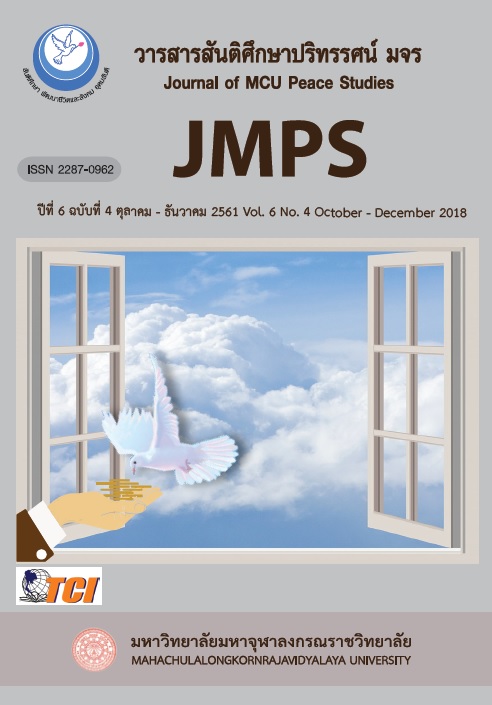The Model of Emotional Quotient Development in Adolescents by Principle of Loving-Kindness (Mettã Bhvanã)
Main Article Content
บทคัดย่อ
The dissertation entitled ‘The Model of Emotional Intelligence Development in Adolescents by Principle of Loving-kindness (mettãya)’ consists of 6 objectives as: 1) to study the Concept, Loving-kindness (mettãya), and Development in the Tripitaka; 2) to study the application of merit-based principles to develop the emotional intelligence of adolescents; 3) to study the effects of emotional intelligence using merit and 4) to synthesize the application of merit-based principles to develop virtue. Emotional Intelligence of Teens It is an integrated research project between qualitative research and experimental research. The researcher selected 58 young subjects as follows at Baannongplaman School Moo 2 Tambon Huaychai, Mae Rim District, Chiang Mai Province.
Regarding to the application of application of Mettã Bhvanã for solving the aggressive behavior, it was found that adolescence is the age of prank, biological changes, psychological and social that can cause the aggressive behaviors. The key principles to keep in mind is to develop the minds of young people to recognize and understand the loving – kindness and followed by the way to practice the loving – kindness for solving the aggressive behaviors. The steps of developing loving – kindness are as follows – 1) to cultivate the loving – kindness for oneself, 2) to cultivate loving – kindness to the adorable person, 3) to cultivate loving – kindness to those who not love or hate and 4) to cultivate loving – kindness to enemies.
The results of emotional intelligence using the principle of mercy found that the emotional intelligence of adolescents before participating in charitable activities. The average score was 145.67 at the normal level. The average score was 152.55, an increase of 6.88 at the .05 level.
The application of the principle of mercy to the development of emotional intelligence of adolescents found that from this principle of mental mercy. It was designed to develop emotional intelligence, which was tested with adolescents. The development of emotional intelligence 9 activities, which from the program to try to make students in the activities have changed. Emotional intelligence in the field of sympathy for others and relationships with others. Knowing and motivating oneself Ability to control emotions and their needs. Responsibility Self-esteem and life satisfaction.
Article Details
ทัศนะและความคิดเห็นที่ปรากฏในบทความในวารสาร ถือเป็นความรับผิดชอบของผู้เขียนบทความนั้น และไม่ถือเป็นทัศนะและความรับผิดชอบของกองบรรณาธิการ ยินยอมว่าบทความเป็นลิขสิทธิ์ของวารสาร


